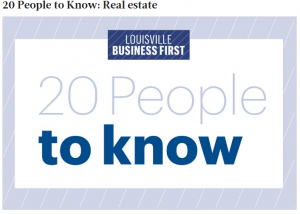Nick Grisanti has followed in his father Paul’s footsteps by becoming one of Louisville Business First‘s annual list of 20 People to Know in Real Estate. His work at the Kentucky Cabinet for Economic Development led to a natural transition into the commercial real estate market.
Here is his Business First questionnaire in full:
What are some up-and-coming areas to look out for in Louisville real estate?The Central Business District and the edge neighborhoods should continue to revitalize as more people are interested in living and working in dense, walkable areas.
What advice would you give to someone who wants to build a real estate portfolio? Be patient for the right property but ready when the right opportunity comes. Before ever looking at a specific piece of real estate, build a strong network of contacts who are going to help define your parameters and execute the deal. This will lead to success in not only making acquisitions, but making money after the purchase. The team should include a knowledgeable real estate broker, financial partner(s), real estate attorney and contractors. No one develops a real estate portfolio alone.
What do you wish more people understood about the way your business operates? The aspect that I have found fascinating in my first year and half in real estate is that the job is essentially a never-ending analysis of opportunity costs. It’s easy to stay busy in real estate. Staying productive and turning away smaller opportunities to focus on bigger ones is the hard part.
What’s one thing most people don’t think about when planning a move to a new space? Buyers should think about disposition before they purchase a property, and tenants should think about expansion, downsizing or relocation before they sign a lease. Always have an exit strategy.
What technology is transforming the way you work every day? There is a lot of noise in commercial real estate tech—new listing services, new information services, new GIS mapping services. It’s a constant deluge and a challenge to quickly analyze what they have to offer and filter out the stuff that won’t help productivity. And most of it probably won’t help productivity.
What’s your industry’s greatest challenge? Real estate brokers and developers need to work with governments and regulatory agencies to ensure that our cities continue to grow and do so in a sustainable way. I would love to see more vertical projects add density to our ever-sprawling city, but these often face challenges from neighbors and municipalities.
Why did you get into the real estate business? My dad finally twisted my arm! Actually, it was more a series of gentle nudges. I was working for the Kentucky Cabinet for Economic Development when I decided to jump into commercial real estate and join Grisanti Group. I really enjoyed working in economic development, and it was very fulfilling to help bring jobs and investment to the commonwealth. Moving into commercial real estate was a natural transition because the fields overlap in many ways.

